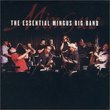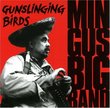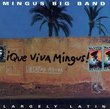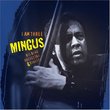| All Artists: Mingus Big Band Title: Live in Tokyo at the Blue Note Members Wishing: 2 Total Copies: 0 Label: Sunny Side Original Release Date: 1/1/2006 Re-Release Date: 9/26/2006 Genres: Jazz, Pop Styles: Avant Garde & Free Jazz, Modern Postbebop, Swing Jazz, Bebop Number of Discs: 1 SwapaCD Credits: 1 UPC: 016728304221 |
Search - Mingus Big Band :: Live in Tokyo at the Blue Note
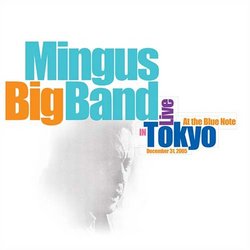 | Mingus Big Band Live in Tokyo at the Blue Note Genres: Jazz, Pop
|
Larger Image |
CD DetailsSimilar CDs
|
CD ReviewsOutstanding! Larry Sakin | Tucson, AZ | 09/30/2006 (5 out of 5 stars) "In December of 1976, Charles Mingus and his quintet performed a series of concerts in Tokyo playing a stripped down version of big band arrangements by Mingus, and of those he admired. Thirty years later, the fourteen piece band that keeps the Mingus name as a legacy performed in Tokyo, playing fully orchestrated versions of the songs Mingus' quintet offered Japanese audiences a generation beforehand. Live In Tokyo is a document of this return engagement. This is an amazing album. From the opening notes of "Wham Bam", to the final moments of "Ecclusiastics", The Mingus Big Band swings and sways through these songs like a typhoon of exalted joy blowing the roof off the famous Blue Note Club. The band is a Who's Who of jazz performers, featuring Eddie Henderson, Jack Walrath, and Alex Sipiagin on trumpets, Abe Burton, Craig Handy, Wayne Escoffery, Seamus Blake, and Ronnie Cuber on saxophones, Ku-umba Frank Lacy, Conrad Herwig, and Earl McIntyre on trombones and tuba, Dave Kikowski on piano, Kenny Davis on bass and Jonathan Blake on drums. Big band enthusiasts will find themselves exhausted by the extremely powerful horn arrangements on "Opus Four", "Free Cell Block F", and "Bird Calls"; Escoffery's solo sax on "Prayer for Passive Resistance", Handy's solo arrangement of "Celia" and the smooth, cool jazz of "Meditations", a quartet piece which includes Davis' brilliant bass lines, Handy playing a la Eric Dolphy on Melody Flute, Kikowski's piano and Abe Burton's frenetic sax. There isn't one false note on Live In Tokyo, and like all great albums, the music stays with you. After listening to the album a third time yesterday, I found myself inadvertently pounding out the back beat by slapping my thighs while waiting for the bus. The album lingers on in my head even now, and I haven't played it since yesterday afternoon. Most importantly, the pleasure the musicians take in playing this date transcends the recording process as each piece pulls you in and makes you feel like you're sitting right there with them. Live In Tokyo is a marvelous tribute to Mingus. It allows his work to breathe again; grow into directions Mingus would have challenged had he lived long enough. But even if you're not a huge Mingus fan, Live In Tokyo is an extremely solid work which will set your foot tapping and tempt you into turning your living room into a temporary swing club. It is a masterful work of art that allows Mingus to live again in the hearts of jazz aficionados' everywhere. " Can't go wrong with the tunes or the group James Lamperetta | Upstate, NY | 01/15/2007 (4 out of 5 stars) "Based out of New York City and boasting some of the city's finest musicians, the Mingus Big Band is one of four ensembles (the others being the Mingus Dynasty, Mingus Orchestra, and Epitaph Orchestra) dedicated to its namesake's music.
"Live in Tokyo" features new arrangements of eight classic Mingus compositions which span three decades and are delivered with gusto and nuance by the fourteen-members of the MBB. Half of the tunes are culled from the `50s. "Bird Calls," is Mingus' tribute to Charlie Parker and the gorgeous ballad "Celia," features Craig Handy as the lone soloist. "Meditations" and "Ecclusiastics" were both composed in the `60s with the latter including trombonist Ku-Umba Frank Lacy fervently preaching from the pulpit of the blues. The program is rounded out with "Opus Four" and "Free Cell Block F," two gems from the `70s, the latter of which was first performed by Mingus' last great quintet which included saxophonist George Adams and Don Pullen. Originally appearing on the album "Changes Two" with the expanded moniker of "Free Cell Block F, Tiz Nazi U.S.A.," the tunes' breezy theme belies its deadly-serious title and provides an excellent backdrop for inspired solos by Handy on flute, Conrad Herwig and Lacy on trombone, and Ronnie Cuber on baritone sax." |

 Track Listings (8) - Disc #1
Track Listings (8) - Disc #1